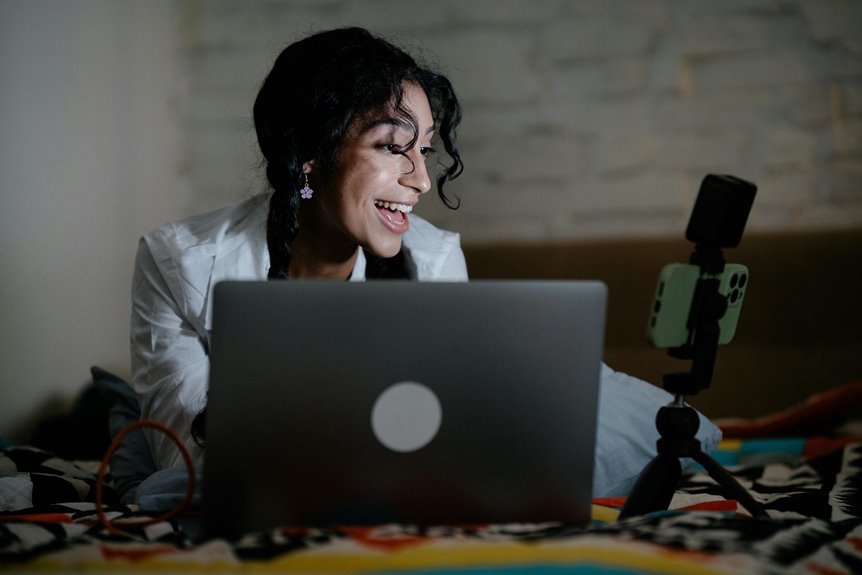Yes, hackers can access your webcam without the light turning on. This occurs when they install malware or exploit software vulnerabilities unnoticed. Many users mistakenly believe the indicator guarantees safety, but it’s not foolproof. In fact, even high-profile individuals aren’t the only targets. It’s crucial to be aware of the risks and take proactive measures to safeguard your privacy. To learn more about protecting your webcam, there are steps you can take right now.
Key Takeaways
- Yes, hackers can access webcams without the light indicator turning on by exploiting software vulnerabilities or using malware.
- Many webcam hacks occur silently, allowing unauthorized access without user awareness.
- Trusting the light indicator as a guarantee of security is a common misconception.
- Malware can manipulate webcam settings, bypassing the light indicator entirely.
- Regular updates and security practices are essential to mitigate webcam hacking risks.
Understanding Webcam Technology
Webcams are essential tools for video communication, enabling you to connect with others in real-time. These devices capture video and audio, transforming your physical presence into digital form.
Most webcams use CMOS sensors to convert light into electrical signals, creating video streams that can be transmitted over the internet. They typically feature built-in microphones, enhancing the communication experience by allowing for clear audio alongside video.
You can find webcams ranging from basic models to high-definition options, catering to various needs. Connecting through USB or built-in laptop cameras, they offer convenience and portability.
Understanding how these devices work helps you appreciate their role in virtual meetings, online classes, and video chats, making your interactions more engaging and effective.
How Webcam Hacking Occurs
While you might think your webcam is secure, hackers can exploit vulnerabilities to gain unauthorized access. They often use methods like malware, phishing, or network exploits to infiltrate your device.
Webcams may seem safe, but hackers can easily exploit vulnerabilities to gain unauthorized access.
Here’s how it typically happens:
- Malware Installation: Hackers may trick you into downloading malicious software that gives them remote control over your camera.
- Phishing Attacks: You might receive emails or messages that appear legitimate but lead you to fake sites, where you unknowingly provide sensitive information.
- Exploiting Network Vulnerabilities: If your network isn’t secure, hackers can access connected devices, including your webcam, without you even knowing.
The Myths Surrounding Webcam Security
How secure do you really think your webcam is? Many people believe that if the light isn’t on, they’re safe from prying eyes. This myth can lead you to underestimate the risks.
In reality, hackers can exploit vulnerabilities in software, allowing them to access your webcam without any indication.
Another common belief is that only high-profile individuals are targeted. In truth, anyone can become a victim, as hackers often cast a wide net.
Some assume that using a webcam cover is enough, but that doesn’t address potential malware hiding in your system.
It’s essential to stay informed and take proactive measures to protect your privacy, rather than relying on outdated myths that can leave you exposed.
Signs That Your Webcam May Be Compromised
Ever wondered if your webcam might be compromised? There are a few telltale signs to watch for. If you notice any of the following, it’s time to investigate:
- Unexpected Activity: Your webcam turns on without your command or you see strange recordings in your files.
- Unusual Computer Behavior: Programs open or close on their own, or your device runs slower than usual.
- Increased Network Activity: You notice your internet connection fluctuates or your data usage spikes unexpectedly, even when you’re not using your webcam.
Being aware of these signs can help you identify if your webcam’s security has been breached.
Stay vigilant and trust your instincts when something feels off!
Tips for Protecting Your Webcam From Hackers
To protect your webcam from hackers, it’s crucial to implement a few proactive measures.
First, cover your webcam with a sliding cover or tape when not in use. This simple step can block unwanted access.
Next, verify your device’s software is up to date; regularly installing updates can patch security vulnerabilities.
Use strong, unique passwords for your accounts and enable two-factor authentication for an extra layer of protection.
Be cautious about granting apps access to your camera; only allow permissions when absolutely necessary.
Finally, consider using reputable antivirus software that includes webcam protection features.
Frequently Asked Questions
Can Antivirus Software Prevent Webcam Hacking?
Antivirus software can help prevent webcam hacking by detecting malicious software and blocking unauthorized access. However, it’s essential to keep your software updated, use strong passwords, and practice safe browsing habits to enhance security.
Are Certain Webcam Models More Vulnerable to Hacking?
Some webcam models boast advanced security features, while others lack basic protections. If you’ve got an older model, you’re more vulnerable to hacking, so it’s essential to stay informed and choose wisely for your safety.
How Can I Tell if My Webcam Is Being Accessed?
To tell if your webcam’s being accessed, watch for unusual activity like flickering lights, unexpected software launches, or unfamiliar applications. You can also check your device’s privacy settings and use security software for added protection.
Are Public Wi-Fi Networks Risky for Webcam Security?
Public Wi-Fi poses peril for your privacy. Hackers can easily intercept data, including webcam access. Always use a virtual private network (VPN) to shield your connection and stay secure while surfing the web in public spaces.
Can Hackers Access My Smartphone Camera Like My Webcam?
Yes, hackers can access your smartphone camera just like your webcam. If they exploit vulnerabilities or use malicious apps, they can turn on your camera without your knowledge, so always keep your device secure and updated.
